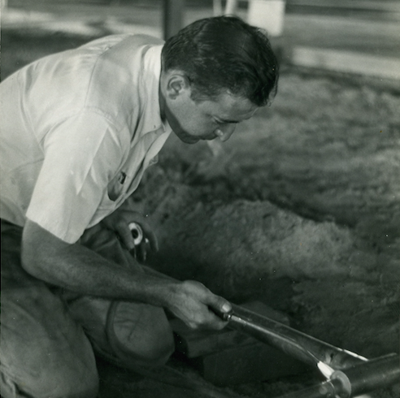
Moses Collis
Moses Collis once owned a well-respected plumbing and air conditioning business in Kingstree. He installed plumbing and HVAC in many of the schools built in the lower half of the state, and in Hardee's franchises and Bi-Lo Supermarkets built in the 1970s.
Lisa Collis Cohen wrote about her father’s life and successful business for the Jewish Merchant Project, an endeavor of the Jewish Historical Society of South Carolina with the help of Historical Columbia and College of Charleston, to identify and document the 800 and still counting, Jewish merchants across the state. Their shops include dry goods stores, men’s and women’s clothing stores, cobbler shops, millinery shops, tailoring and alteration shops, Army/Navy surplus stores, pawnshops and secondhand stores, auction houses, liquor stores or distributorships, wholesale warehouses, grocery stores, bakeries, meat markets, and others.
By the late 1800s, Jewish families began to come to the United States fleeing the oppressive governments of Central and Eastern Europe. They found a better life for themselves and their families in our state, especially in the port cities of Charleston, Georgetown, and Beaufort, also Columbia.
Moses Collis was born in Charleston on Oct. 24, 1918, to Meyer and Lena Shiavitz Collis. The Collis family immigrated to the United States from Bialystok, then a part of Prussia, now the largest city in northeastern Poland.
“Mosie” was still a boy when the Great Depression began. He earned money for his family running a paper route for The News and Courier, and worked as a plumber’s helper digging ditches. He graduated from the High School of Charleston, and at 16 became the youngest licensed journeyman plumber in the state, according to Cohen. Following graduation, he took his plumbing skills to the Navy. He dreamed of going to medical school, but shortly after he was discharged, the Japanese bombed Pearl Harbor and he re-enlisted. He left the service as a Chief Petty Officer.
Around 1945 he came to Kingstree at the urging of family to open his own plumbing and heating business. He was the only licensed plumber in town and had a small plumbing fixture showroom located on Mill Street next door to the fire station. As the business grew, Collis built an office with a showroom, warehouse and fenced storage area at 303 West Academy Street. He added air conditioning and refrigeration to his expertise and became a licensed mechanical contractor. He renamed his business Moses Collis Mechanical Contractors, Inc. He married Jennie Goldberg Collis in 1957. She kept books and managed the office for him.
“My father employed both white and African American employees. He paid them well and treated them equally and respectfully while holding them to high standards,” writes Cohen. “He was a celebrated Carrier equipment dealer and he and my mother traveled the world on reward trips.” She bonded with her father over unfurled blueprints of jobs, as the two worked together to do estimates at the dining room table on weekends.
In 1972, Collis suffered a severely fractured left ankle when he fell from the roof of the new Exchange Bank building in Kingstree. In the years that followed, employees left for other opportunities, and the economy of Williamsburg County shifted meaning smaller jobs and repair work became the bread and butter of the business. Moses lost his wife unexpectedly in September of 1990. He was in ill health and the business closed in 1991.
Subway now sits at the former site of Moses Collins Mechanical Contractors, Inc. Cars drive by unaware of the business built by the hard work and determination of Moses Collis.
In an article written for the Jewish Historical Society of South Carolina, Stephen Whitfield points out that Jewish people didn’t find themselves in the fields very often. It was common for a person of Jewish decent to be a merchant of some sort.
“The impact of merchants in the Southern Jewish past is too pronounced to be contested, and too important to be ignored or forgotten,” Whitfield writes.
Children of shop owners often chose other paths, but the history remains through these stories.
On Sunday, January 21, the Williamsburg County Historical Society will welcome guest speakers, Rebecca Woodruff from Historical Columbia and Rachel Gordin Barnett, Executive Director of the Jewish Historical Society of SC to speak about the Jewish Merchant Project and the important contributions the Jewish community has made to Williamsburg County and across South Carolina. The event runs 3:30 p.m. to 5 p.m. at the Williamsburg Historical Society’s African American Archives Building at 127 Hampton Avenue, Kingstree. It is free to the public and light refreshments will be available.
The Jewish Merchant Project was launched in 2016, and continues to collect the stories of Jewish merchants across South Carolina, both past and present. Their website includes a searchable map, illustrated narratives, photos and more. For more information about the Jewish Historical Society of South Carolina, visit JHSSC.org. Details about the event on January 21, can be found on the Williamsburgh Historical Museum Facebook page.
Over the next few weeks, The News will continue to highlight accomplishments of the Jewish community.







